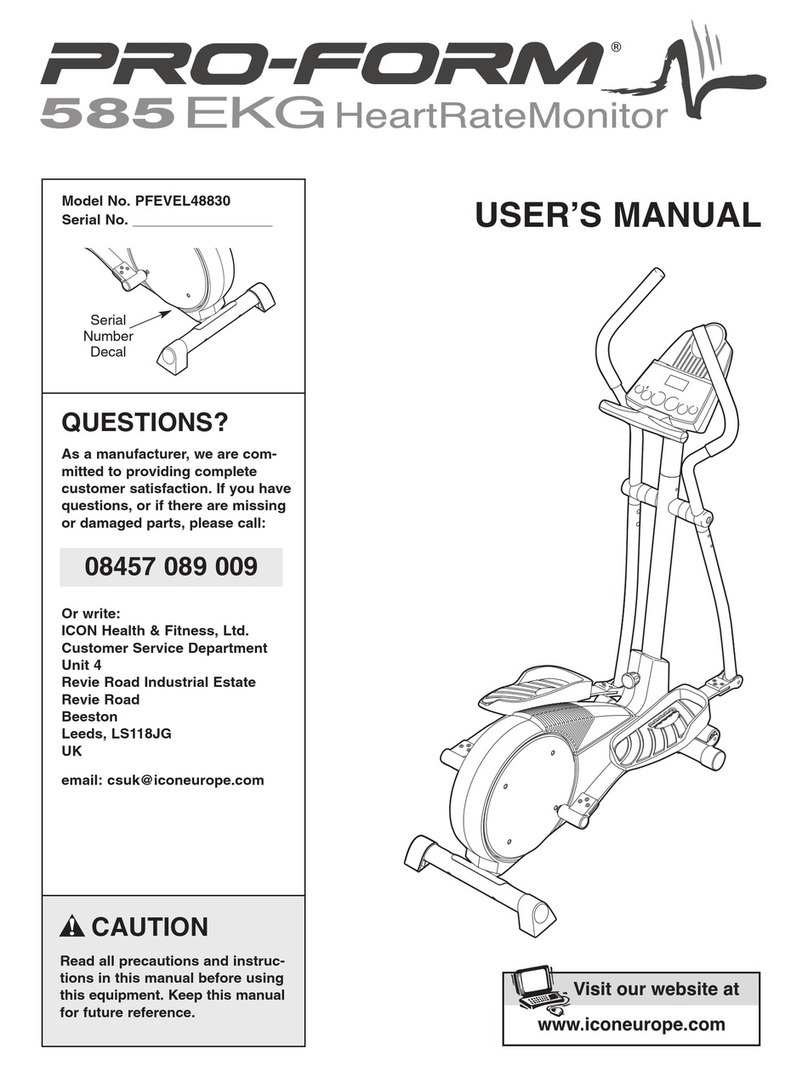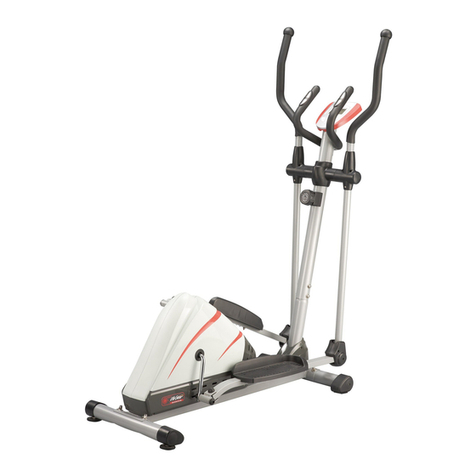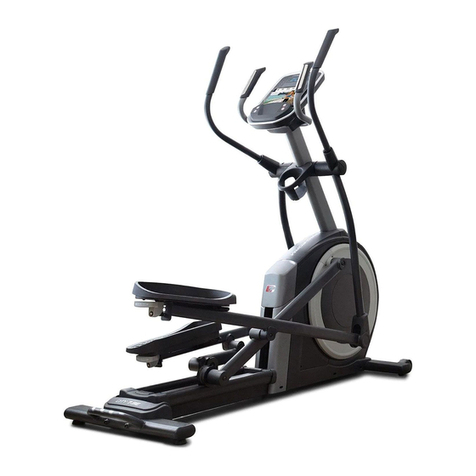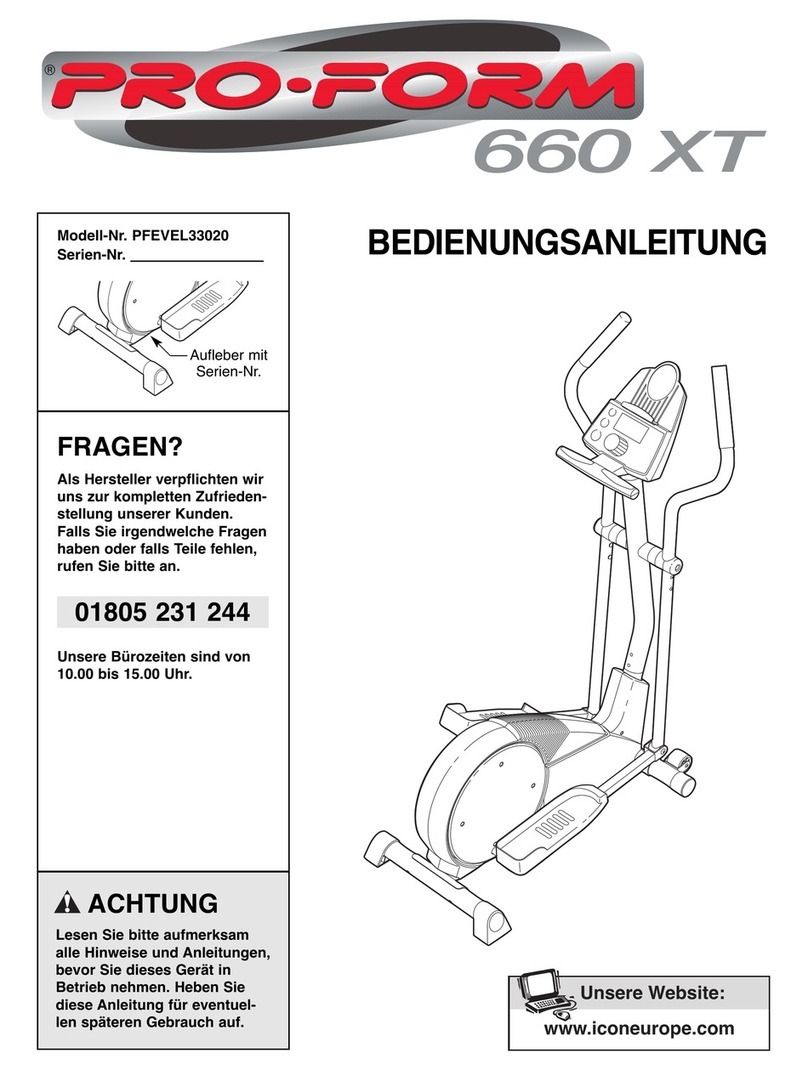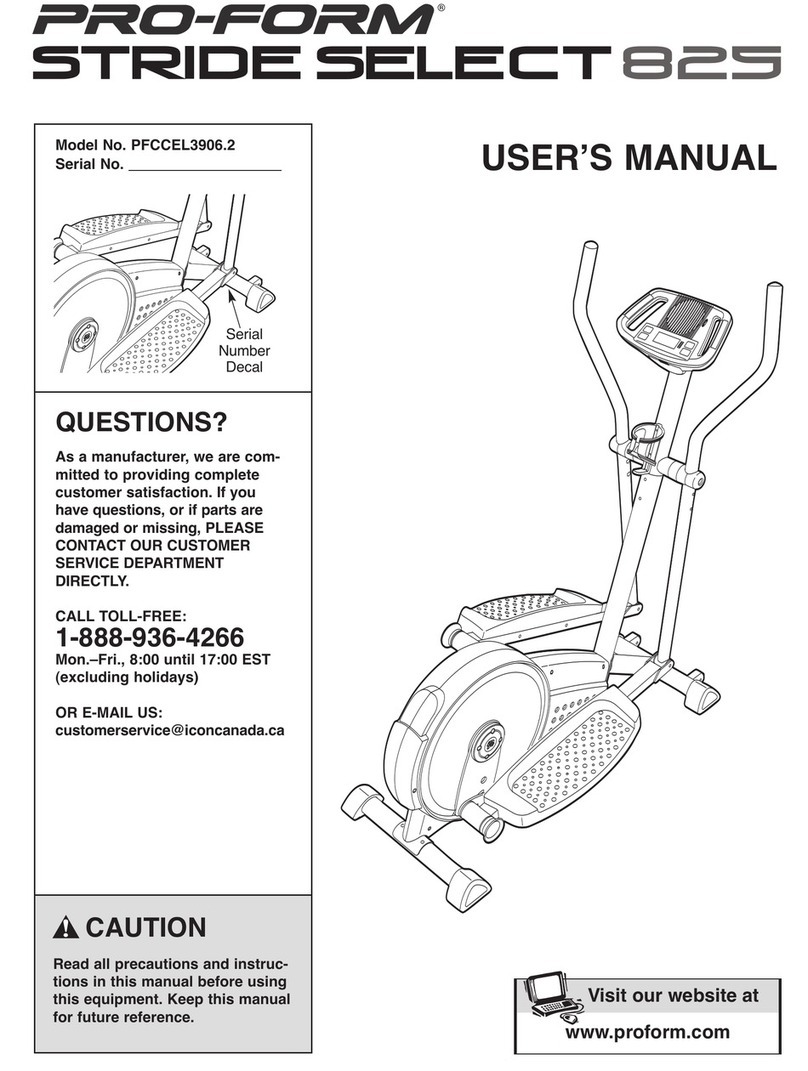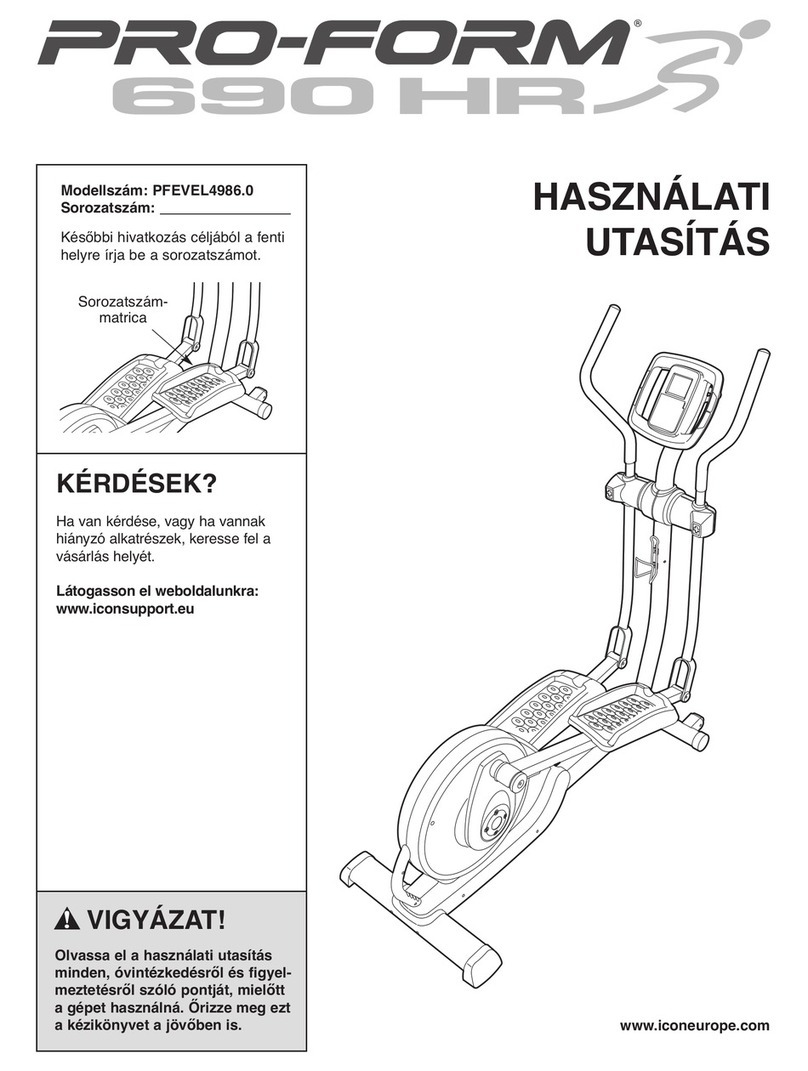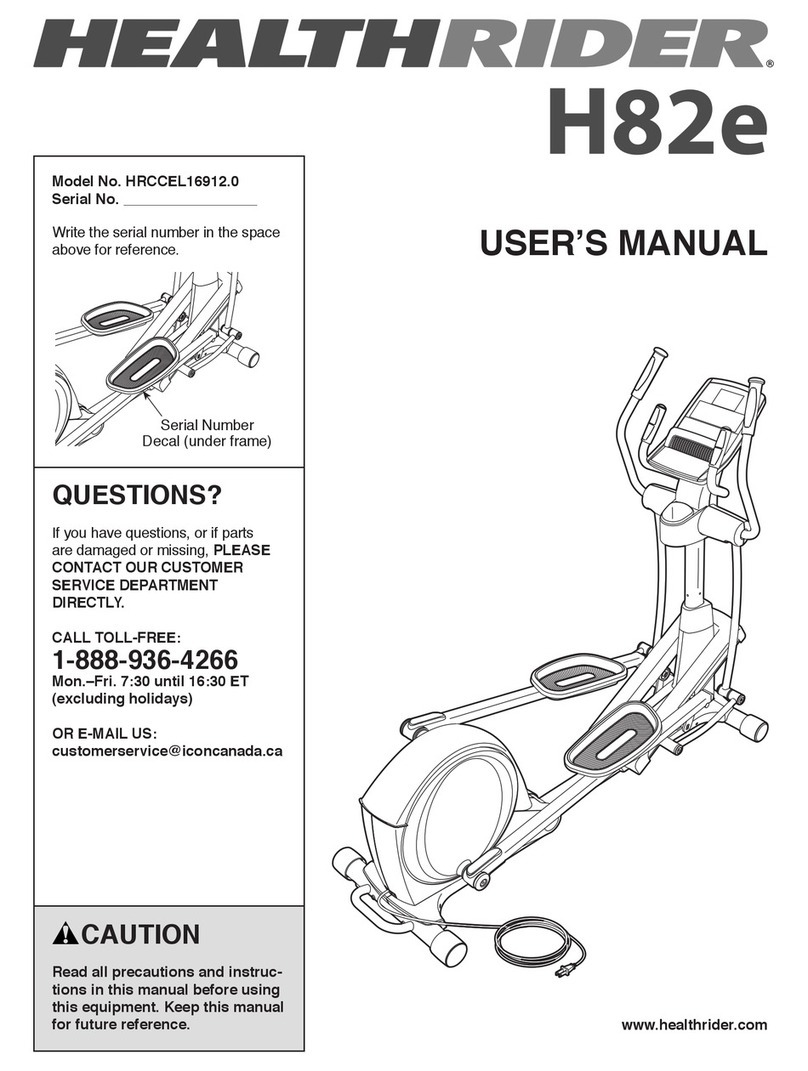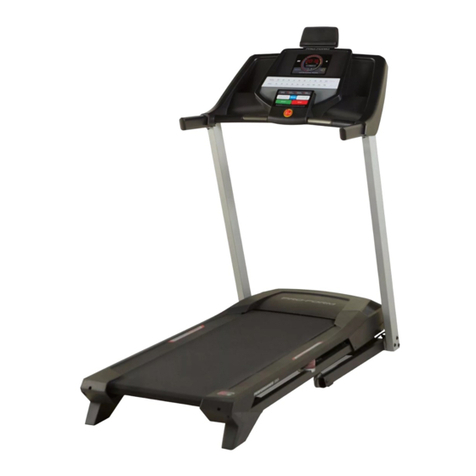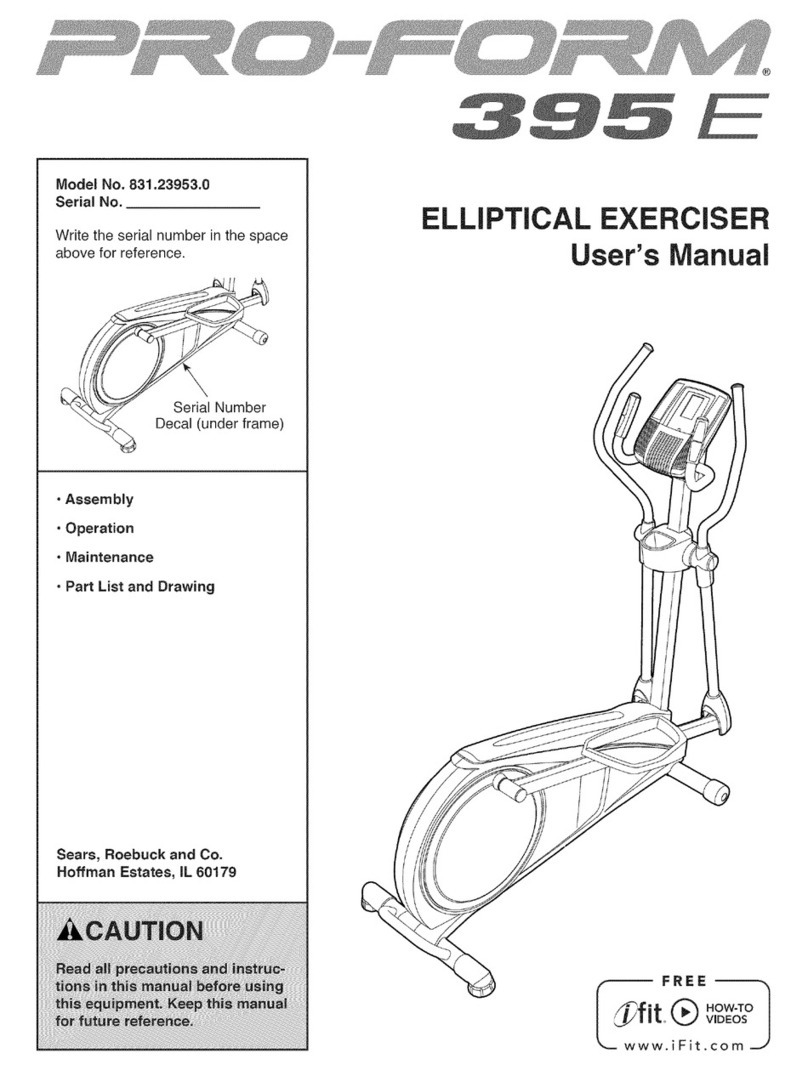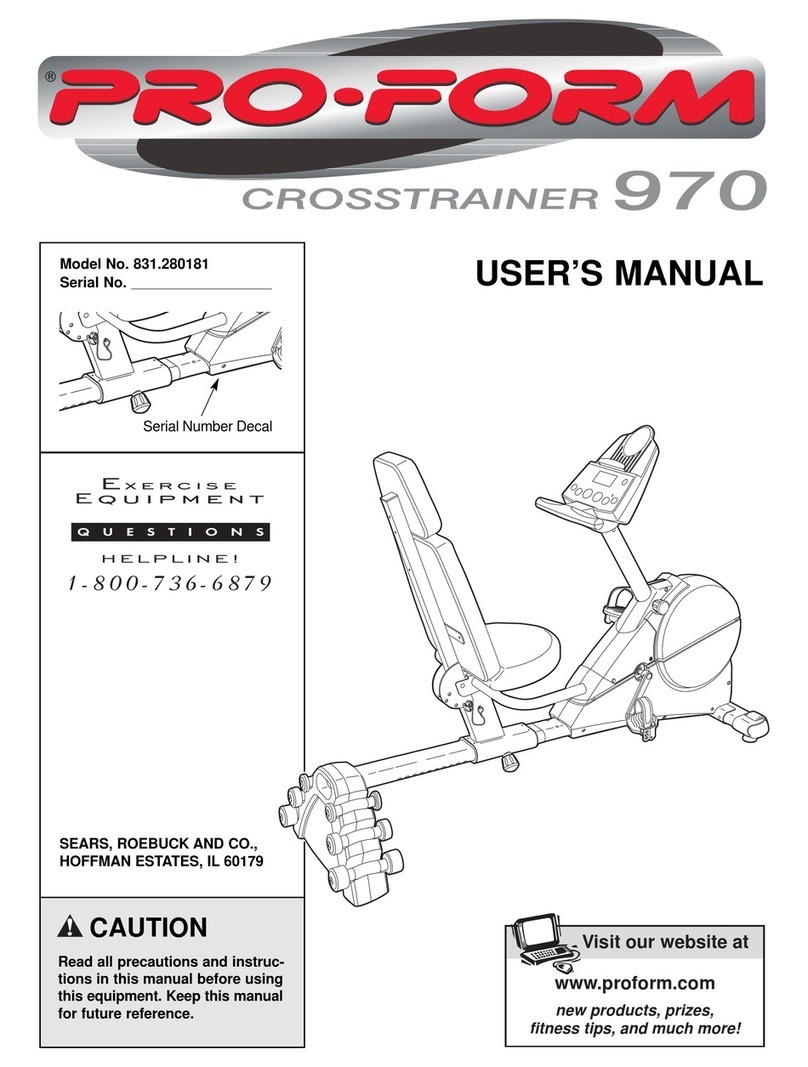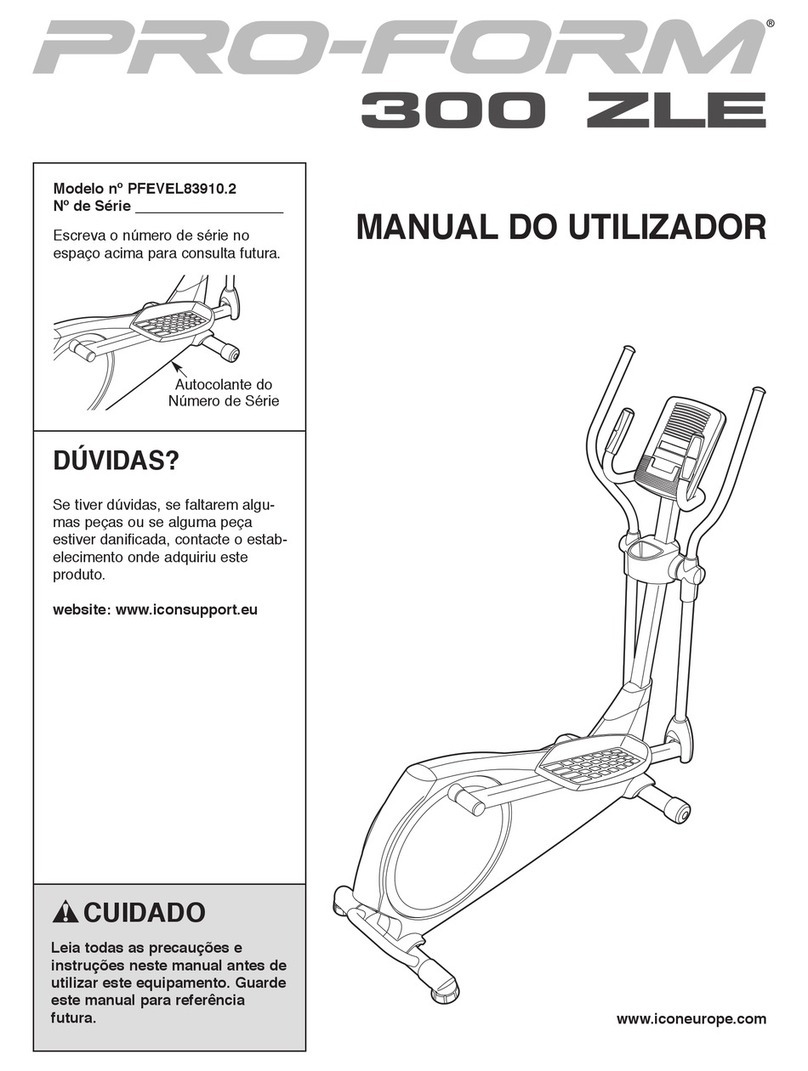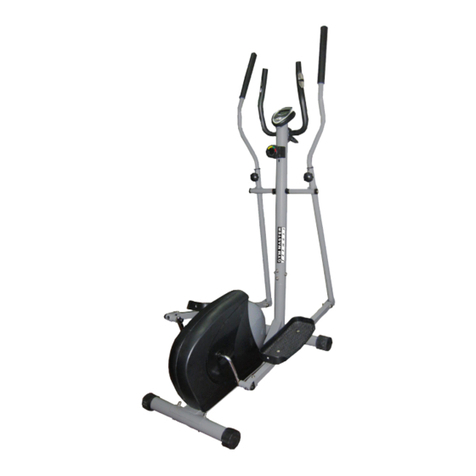Treo Fitness E103 User manual

ELLIPTICAL OWNER’S MANUAL
FOR MODEL :
E103

Introduction
Important Precautions
Before You Begin
Elliptical Operation
Assembly Instructions
Conditioning Guidelines
Troubleshooting & Maintenance
3
4
5
6
14
22
28
CONGRATULATIONS and THANK YOU for your purchase of this Treo Fitness Elliptical!
Whether your goal is to win a race or simply enjoy a fuller, healthier lifestyle, a Treo Fitness Elliptical can
help you attain it – adding club-quality performance to your at-home workouts, with the ergonomics and
innovative features you need to get stronger, healthier and faster. We’re committed to designing fitness
equipment from the inside out, so we use only the highest quality components. It’s a commitment we back
with one of the strongest warranty packages in the industry.
You want exercise equipment that offers the most comfort, the best reliability and the highest quality in its
class. A Treo Fitness Elliptical delivers!
INTRODUCTION
TABLE OF CONTENTS
3

SAVE THESE INSTRUCTIONS
When using an electrical product, basic precautions should always be followed, including the following:
Read all instructions before using this elliptical. It is the responsibility of the owner to ensure that all
users of this elliptical are adequately informed of all warnings and precautions.
•
If you experience chest pains, nausea, dizziness, or shortness of breath, stop exercising immediately
and consult your physician before continuing.
•
Maintain a comfortable pace. Do not sprint above 80 rpms on this machine.
•
To maintain balance, it is recommended to keep a grip on the handlebars while exercising, mounting
or dismounting the machine.
•
Do not wear clothes that might catch on any part of the elliptical.
•
Do not turn pedal arms by hand.
•
Make sure handlebars are secure before each use.
•
Do not insert or drop any object into any opening.
•
Unplug elliptical before moving or cleaning it. To clean, wipe surfaces down with soap and slightly
damp cloth only; never use solvents. (See MAINTENANCE)
•
This elliptical should not be used by persons weighing more than 110kg. Failure to comply will void
the warranty.
•
This elliptical is intended for in-home use only. Do not use this elliptical in any commercial, rental,
school or institutional setting. Failure to comply will void the warranty.
•
Do not use elliptical in garages, porches, pool rooms, bathrooms, car ports or outdoors. Failure to
comply may void the warranty.
•
Use the elliptical only as described in this manual.
IMPORTANT PRECAUTONS
To reduce the risk of burns, fire, electrical shock or injury to persons:
CONGRATULATIONS!
on choosing your elliptical. You’ve taken an important step in developing
and sustaining an exercise program! Your elliptical is a tremendously effective tool for achieving your
personal fitness goals. Regular use of your elliptical can improve the quality of your life in so many
ways.
HERE ARE JUST A FEW OF THE HEALTH BENEFITS OF EXERCISE:
• Weight Loss
• A Healthier Heart
• Improved Muscle Tone
• Increased Daily Energy Levels
The key to reaping these benefits is to develop an exercise
habit. Your new elliptical will help you eliminate obstacles that
prevent you from exercising. Inclement weather and darkness
won’t interfere with your workout when you use your elliptical
in the comfort of your home. This guide provides you with
basic information for using and enjoying your new machine.
LOCATION OF THE ELLIPTICAL
Place the elliptical on a level surface. There should be 183
cm (6 feet) of clearance behind the elliptical, 91cm (3 feet)
on each side and 30 cm (1 foot) in front for the power cord
(See diagram to the right). Do not place the elliptical in any
area that will block any vent or air openings. The elliptical
should not be located in a garage, covered patio, near water
or outdoors.
BEFORE YOU BEGIN
54
It is essential that your elliptical is used only indoors, in a climate controlled room. If your elliptical has been
exposed to colder temperatures or high moisture climates, it is strongly recommended that the elliptical is
warmed up to room temperature before first time use. Failure to do so may cause premature electromic failure.
At NO time should pets or children under the age of 12 be closer to the elliptical than 304 cm(10 feet).
At NO time should children under the age of 12 use the elliptical.
Children over the age of 12 should not use the elliptical without adult supervision.
WARNING
91 cm
30 cm (1 foot )
183 cm (6 feet )
(3 feet )
91 cm
(3 feet )

POWER
Your elliptical is powered by a power supply. The power must be plugged into the power jack, which
is located in the front rear of the machine near the REAR STABILIZER TUBE.
Things you should know before exercise
A) MONITOR DISPLAY: Time / Distance / RMP / Speed / Calories / Pulse / Age / Target Heart Rate /
Pulse recovery / Temperature
B) START/STOP key: a. Allows you to quick start the computer without selecting a program.
b. press the key to STOP exercise.
C) UP key: Press to increase the resistance or the value of Time, Distance, Calories, Age and select
Gender and Program.
D) DOWN key: a. Press the key to decrease the resistance or the value of Time, Distance, Calories, Age
and select Gender and Program.
E) ENTER key: a. Press to set up with current data.
b. When not exercising, by holding this key for over two seconds will reset all values.
c. While setting the Clock, pressing the ENTER key will start setting the hour and minute.
F)
BODY FAT key: Press to input your HEIGHT, WEKGHT, GENDER and AGE then to measure your body fat ratio.
G) PULSE RECOVERY key: Press to activate heart rate recovery function.
1) Turn on Elliptical by pressing any key.
2) Press MODE button and SET button to adjust, then start.
3) The resistance level can be adjusted during the workout by using the RESISTANCE KNOB.
MOVING
Your elliptical has a pair of transport wheels built
into the FRONT STABILIZER TUBE. To move,
first remove the power supply and firmly grasp the
CONSOLE MAST, carefully tilt and roll.
ELLIPTICAL OPERATION
QUICK START
Do not operate the elliptical if the power cord or plug is damaged.
If the elliptical appears to not be working properly, do not use the elliptical.
Our ellipticals are well built and heavy, weighing up to 110 kg ! Use care and
additional help if necessary when moving.
76
WARNING
WARNING
E103 CONSOLE DISPLAY
A
C
B
D
E
F
GRECOVERY BODY FAT
START
STOP UP
ENTER ENTER
DOWN
SPEED
HEIGHT TIME
START STOP
COUNTSPEED C F BMR
WEIGHT DISTANCE
GENDER RPM
K
M
kg
Lb
PULSE FAT%
CAL BMI
PROGRAM
LEVEL
AGE
0
10
20
30
60
40
50
O O

98
PROGRAM PROFILES
Manual (P1)
The user can start exercise by pressing START/STOP key. The default resistance level is 5. Users may
exercise in any desirous of resistance level (Adjusting by UP/DOWN keys during the workout) with a
period of time or a number of calories or a certain distance.
Steps, Hill, Rolling, Valley, Fat Burn, Ramp, Mountain, Intervals, Random, Plateau,
Fartlek, Precipice Program (P2-P13)
Users can exercise with different level of loading in different intervals as the profiles show. Users may
exercise in any resistance level (Adjusting by UP/DOWN keys during the workout) with a period of time
or a number of calories or a certain distance.
User 1 and User 4 (P14-P17)
Users are free to create the values in the order of TIME, DISTANCE, CALORIES and the resistance
level in 10 columns. The values and profiles will be stored in the memory after setup. Users may also
change the ongoing loading in each column by UP/DOWN keys, and they will not change the resistance
level stored in the memory.
Target Heart Rate (P18-P22)
The target heart rate workout mode allows the user to program their desired heart rate among 55%,
65%, 75, 85% max. H.R.C. or workout by your target heart rate value by simply setting your AGE,
TIME, DISTANCE, CALORIES or TARGET HEART RATE. In these programs, the program will adjust
the resistance level every 20 sec. according to the heart rate detected.
Body Fat (P23)
Program 24 is a special program design to calculate the users’ body fat ratio and to offer a specific
loading profile for users. There are 3 body types divided according to the FAT% calculated.
Type1: BODY FAT% > 27
Type2: 27 BODY FAT% 20
Type3: BODY FAT % < 20
The computer will show the test results of FAT PERCENT, BMI and BMR.
E103 CONSOLE OPERATION
≧ ≧

1110
PROGRAM 14
PROGRAM 15
USER 1
USER 2
PROGRAM 16
USER 3
PROGRAM 17
USER 4
USER SETTING PROGRAM
RAMP MOUNTAIN
RANDOM PLATEAU FARTLEK
PRECIPICE
INTERVALS
PROGRAM 7 PROGRAM 8 PROGRAM 9
PROGRAM 1 PROGRAM 2 PROGRAM 3
PROGRAM 4 PROGRAM 5 PROGRAM 6
PROGRAM 10
PROGRAM 13
PROGRAM 11 PROGRAM 12
HILL
MANUAL STEPS
FAT BURNROLLING VALLEY
E103 LCD WORK OUT GRAPHICS
PROGRAM 1 PROGRAM 2 PROGRAM 3
MANUAL STEPS HILL
PROGRAM 4 PROGRAM 5 PROGRAM 6
ROLLING VALLEY FAT BURN
PROGRAM 7 PROGRAM 8 PROGRAM 9
RAMP MOUNTAIN INTERVALS
PROGRAM 10 PROGRAM 11 PROGRAM 12
RANDOM PLATEAU FARTLEK
PROGRAM 13
PRECIPICE
PROGRAM 14
USER 1
PROGRAM 15
USER 2
PROGRAM 16
USER 3
PROGRAM 17
USER 4
USER SETTING PROGRAM

BODY FAT TEST PROGRAMS
PROGRAM 24
BODY FAT (STOP MODE)
Workout Time: 40 minutes Workout Time: 40 minutes Workout time: 20 minutes
Workout Time: 40 minutes Workout Time: 40 minutes Workout time: 20 minutes
BODY FAT (START MODE)
One of the Following Six Profiles Will Display Automatically after Measuring Your BODY FAT:
PROGRAM 18
PROGRAM 19
PROGRAM 20
PROGRAM 21
PROGRAM 22
USER SETTING PROGRAM
55% H.R.C.
65% H.R.C.
75% H.R.C.
85% H.R.C.
TARGET H.R.C.
1312
PROGRAM 18
55% H.R.C.
PROGRAM 19
65% H.R.C.
PROGRAM 20
75% H.R.C.
PROGRAM 21
85% H.R.C.
PROGRAM 22
TARGET H.R.C.
USER SETTING PROGRAM BODY FAT TEST PROGRAMS:
PROGRAM 23
BODY FAT (STOP MODE) BODY FAT (START MODE)
One of the Following Six Proles Will Display Automatically after Measuring Your BODY FAT:
Workout Time: 40 minutes Workout Time: 40 minutes Workout time: 20 minutes
Workout Time: 40 minutes Workout Time: 40 minutes Workout time: 20 minutesRANDOM

ASSEMBLY INSTRUCTIONS
PARTS LIST
STEP 1
Mount the front stabiliser (2) onto the main frame (1) by using 2 x square neck bolts (3), 2 x curved
washers (6), 2 x split washers (7) and 2 x domed nuts (8).
STEP 2
Mount the rear stabiliser (19) onto the main frame (1) by using the two allen bolts (14), the 2 x curved
washers (6) and 2 x split washers (7).
1
X1
10
71
2
19
64 72
M8*1.25*75L D22*D8.5*1.5T D15.4*D8.2*2T
M8*1.25*15L
M8*1.25*20L
D14*D6.5*0.8T
367
9820
73
D25*D8.5*2T
66 M8*1.25*25L
40
78
X1
X1
X1
X1
X1
X1
X1
X1
X1
X2
X10
X2
X2
X2
X14 X16
X4
X2X1
M6*1*45L X4
X1
49
M8*1.25*70L
14 X2
17A 17B
52L
52R
21L
21R
ST4*20L
92
1
2
3
6
7
8
19 14
7
6
32
6
7
8
1
19
6
7
14
Weight and surface area when assembled
(L) 112 cm x (W) 65 cm, weight 43.5-48 kg Gross
1514

STEP 3
Attach the left and right pedals (21L&21R) to the pedal support tube (11) using the 4 x square neck
screw (20), 4 x flat washers (73) and 4 x knobs (77).
STEP 4
Slide the handlebar post cover (49) over the handlebar post (10).
STEP 5
Fasten the upper computer cable (29) to the motor connector (30).
STEP 6
Attach the handlebar post (10) to the main frame (1) with 4 x curved washers (6), 4 x split washers
(7) and 4 x allen bolts (9).
STEP 7
Slide the handlebar post cover (49) down to cover bolts.
Pedal adjustment
The position of the pedals can be altered to
achieve the most comfortable position for the
user.
21R
11
21L
21R
21L
11
21R
20
73
77
21L
11
20
11
73
77
21R
21L
STEP-3
(d)
10
49
49
30
30
29
29
9
7
6
1
10
49
30
29
10
49 29
30
10
49
29
9
7
6
1
30
1716

STEP 8
Pass the shaft axle (71) through the 2 x movable handlebar supports (12), 2 x sea washers (67) and
the handlebar post (10). Secure at each end using x2 flat washers (66), x 2 split washers (7), x 2 bolts
(40) and x 2 bolt caps (38) (see diagram).
STEP 9
Mount the fixed handlebar (72) to the handlebarpost (10) using 2 x bolts (9), 2 x split washers (7)
and 2 x curved washers (6).
STEP 10
Attach the left and right handlebars (52L & 52R) to the movable handlebar supports (12), using 4 x
bolts (9), 4 x split washers (7) and 4 x curved washers (6).
67
67
67
10 12
38
40
66
7
38
40
66
7
71
71
12
10
67
10
67
67
12
71 66
66
7
40
38
71
12
67
67
10
7
40
38
52R
10
52L
12
9
9
72
7
7
66
55
52R
55
72
52L
10
12
9
9
7
7
6
6
1918

STEP 11
Fasten the two handlebar pulse sensor connectors (65) to the matching connectors on the console
(64), then fasten the upper computer cable (29) to the back of the console (64).
STEP 12
Mount the console (64) on the handlebar post (10) using 4 x screws (76).
STEP 13
Attach the front cover (17A) and the back cover (17B) to the handle bar post (10) using 4 x screws (92).
STEP 14
Plug the power adaptor (78) into the main frame (1).
76
64
29
65
64
29
65
76
64
65
64
65
29
29
78
10
91
17B
17A
92
17B
17A
10
78
2120

HEART RATE
TARGET HEART RATE ZONE CHART
CONDITIONING GUIDELINES
2322
HANDLEBARS
Place the palm of your hands directly on the grip pulse handlebars. Both hands must grip the bars for
your heart rate to register. It takes 5 consecutive heart beats (15-20 seconds) for your heart rate to
register. When gripping the pulse handlebars, do not grip tightly. You may experience an erratic readout
if consistently holding the grip pulse handlebars. Make sure to clean the pulse sensors to ensure proper
contact can be maintained.
WARNING:
Do not prress excessively hard on the sensor as this may cause damage.
What is Target Heart Rate Zone?
Target Heart Rate Zone tells you the number
of times per minute your heart needs to beat to
achieve a desired workout effect. It is represented
as a percentage of the maximum number of times
your heart can beat per minute. Target Zone will vary
for each individual, depending on age, current level
of conditioning, and personal fitness goals. The
American Heart Association recommends working-
out at a Target Heart Rate Zone of between 60%
and 75% of your maximum heart rate. A beginner
will want to workout in the 60% range while a more
experienced exerciser will want to workout in the
70-75% range. See chart for reference.
EXAMPLE:
For a 42-year-old user: Find age along the bottom of the chart (round to 40), follow age column up to the
target zone bar. Results: 60% of maximum Hear Rate = 108 Beats Per Minute, 75% of maximum Heart
Rate = 135 Beat Per Minute.
ALWAYS CONSULT YOUR PHYSICIAN BEFORE BEGINNING AN EXERCISE PROGRAM.
ALWAYS CONSULT YOUR PHYSICIAN BEFORE BEGINNING AN EXERCISE PROGRAM.
HOW OFTEN? (Frequency of Workouts)
The American Heart Association recommends that you exercise at least 3 to 4 days per week to maintain
cardiovascular fitness. If you have other goals such as weight or fat loss, you will achieve your goal faster
with more frequent exercise. Whether it’s 3 days or 6 days, remember that your ultimate goal should be to
make exercise a lifetime habit. Many people are successful staying with a fitness program if they set aside
a specific time of day to exercise. It doesn’t matter whether it’s in the morning before breakfast, during
lunch hour or while watching the evening news. What’s more important is that it’s a time that allows you to
keep a schedule, and a time when you won’t be interrupted. To be successful with your fitness program,
you have to make it a priority in your life. So decide on a time, pull out your day planner and pencil in your
exercise times for the next month!
HOW LONG? (Duration of Workouts)
For aerobic exercise benefits, it’s recommended that you exercise from between 24 and 60 minutes per
session. But start slowly and gradually increase your exercise times. If you’ve been sedentary during the
past year, it may be a good idea to keep your exercise times to as little as five minutes initially. Your body
will need time to adjust to the new activity. If your goal is weight loss, a longer exercise session at lower
intensities has been found to be most effective. A workout time of 48 minutes or more is recommended
for best weight loss results.
HOW HARD? (Intensity of Workouts)
How hard you workout is also determined by your goals. If you use your machine to prepare for a 5K
workout, you will probably work out at a higher intensity than if your goal is general fitness. Regardless
of your long term goals, always begin an exercise program at low intensity. Aerobic exercise does not
have to be painful to be beneficial! There are two ways to measure your exercise intensity. The first is
by monitoring your heart rate(using the grip pulse handlebars), and the second is by evaluating your
perceived exertion level(this is simpler than it sounds!).
PERCEIVED EXERTION LEVEL
A simple way to gauge your exercise intensity is to evaluate your perceived exertion level. While
exercising, if you are too winded to maintain a conversation without gasping, you are working out too
hard. A good rule of thumb is to work to the point of exhilaration, not exhaustion. If you cannot catch your
breath, it’s time to slow down. Always be aware of these warning signs of overexertion.
%001
%57
%06
ETUNIM REP STAEB
20 25 30 35 40 45 50 55 60 65
AGE
ENOZ TEGRAT
21 0 11 7 11 4 11 1 01 8 01 5 01 2 99 79 39
51 0 41 6 41 3 31 9 31 5 31 1 21 8 21 4 21 0 11 6

2524
WARM UP
The first 2 to 5 minutes of a workout should be devoted to warming up. The warm-up will limber your
muscles and prepare them for more strenuous exercise. Make sure that you warm-up on your product
at a slow pace. The warm up should gradually bring your heart rate into your Target Heart Rate Zone.
COOL DOWN
Never stop exercising suddenly! A cool-down period of 3-5 minutes allows your heart to readjust to the
decreased demand. Make sure that your cool down period consists of a very slow pace to allow your
heart rate to lower. After the cool-down, repeat the stretching exercises listed previously to loosen and
relax your muscles.
An important step in developing a long term fitness program is to determine your goals. Is your
primary goal for exercising to lose weight? Improve muscle? Reduce stress? Prepare for the spring
racing schedule? Knowing what your goals are will help you develop a more successful exercise
program. Below are some common exercise goals:
•
Weight Loss - lower intensity, longer duration workouts
•
Improve Body Shape and Tone - interval workouts, alternate between high and low intensities
•
Increased Energy Level - more frequent daily workouts
•
Improved Sports Performance - high intensity workouts
•
Improved Cardiovascular Endurance - moderate intensity, longer duration workouts
If possible try to define your personal goals in precise, measurable terms, and then put your goals
in writing. The more specific you can be, the easier it will be to track your progress. If your goals are
long term, divide them up into monthly and weekly segments. Longer term goals can lose some of the
immediate motivation benefits. Short term goals are easier to achieve. Your console provides you with
several readouts that can be used to record your progress. You can track Distance, Calories or Time.
KEEPING AN EXERCISE DIARY
To make your personal exercise log book, photocopy the weekly and monthly log sheets, which are
located on the following pages.
As your fitness improves, you can look back and see how far you’ve come!
ACHIEVING YOUR FITNESS GOALS
STRETCH FIRST
Before using your product, it is best to take a few minutes to do a few gentle stretching exercises.
Stretching prior to exercise will improve flexibility and reduce chances of exercise related injury. Ease
into each of these stretches with a slow gentle motion. Do not stretch to the point of pain. Make sure
not to bounce while doing these stretches.
1. STANDING CALF MUSCLE STRETCH
Stand near a wall with the toes of your left foot about 18" from the wall,
and the right foot about 12" behind the other foot. Lean forward, pushing
against the wall with your palms. Keep your heels flat and hold this position
for a count of 15 seconds. Make sure that you do not bounce while
stretching. Repeat on the other side.
2. STANDING QUADRICEP STRETCH
Using a wall to provide balance, grasp your left ankle
with your left hand and hold your foot against the back
of your thigh for 15 seconds. Repeat with your right
ankle and hand.
3. SITTING HAMSTRING & LOWER BACK MUSCLE STRETCH
Sit on the floor with your legs together and straight out in front of you. Do
not lock your knees. Extend your fingers towards your toes and hold for a
count of 15 seconds. Make sure that you do not bounce while stretching.
Sit upright again. Repeat one time.
STRETCHING
THE IMPORTANCE OF A WARM-UP & COOL DOWN
TIPS TIPS
TIPS

WEEKLY LOG SHEETS MONTHLY LOG SHEETS
WEEK # WEEKLY GOAL
WEEKLY TOTALS :
D AY
SUNDAY
MONDAY
TUESDAY
WEDNESDAY
THURSDAY
FRIDAY
SATURDAY
DATE DISTANCE CALORIES TIME COMMENTS
WEEK # WEEKLY GOAL
WEEKLY TOTALS :
D AY
SUNDAY
MONDAY
TUESDAY
WEDNESDAY
THURSDAY
FRIDAY
SATURDAY
DATE DISTANCE CALORIES TIME COMMENTS
WEEK # WEEKLY GOAL
WEEKLY TOTALS :
D AY
SUNDAY
MONDAY
TUESDAY
WEDNESDAY
THURSDAY
FRIDAY
SATURDAY
DATE DISTANCE CALORIES TIME COMMENTS
2726

TROUBLESHOOTING
Treo Fitness elliptical is designed to be reliable and maintenance-free. However, if you do experience
problems with your elliptical, please refer to the troubleshooting guide listed below.
PROBLEM:
The console does not light up.
SOLUTION:
Verify the following:
•
Check the batteries.
•
Is the outlet of the machine fuctional? Double check that the breaker has not tripped.
•
The correct adapter is being used. Only use the adapter provided or authorized by Treo Fitness.
•
The adapter is not pinched or damaged and is properly plugged into the outlet AND the machine.
•
The power switch is turned to the ON position (may not apply to all models).
•
Turn off the machine and unplug power cord. Remove the console and check that all connections
to the console are secure and not damaged or pinched.
PROBLEM:
The console lights up but the Time/RPM’s do not count.
SOLUTION:
Verify the following:
•
Turn off machine and unplug power cord. Remove the console and check that all connections to the
console are secure and not damaged or pinched.
•
If doing the above does not fix the problem, the speed senor and/or magnet may have become
disloged or damaged
PROBLEM:
The resistance levels seem to be incorrect, seeming too hard or too easy.
SOLUTION:
Verify the following:
•
The correct adapter is being used. Only use the adapter provided or authorized by Treo Fitness.
•
Reset the console and allow the resistance to reset to the default position. Restart and retry the
resistance levels.
PROBLEM:
The elliptical makes a squeaking or chirping noise.
SOLUTION:
Verify the following:
•
The elliptical is on a level surface.
•
Loosen all bolts attached during the assembly process, grease the threads, and tighten again.
PROBLEM:
There is no heart rate reading.
SOLUTION:
Remove the console and verify that the heart rate cables are attached properly, making
sure that the cables are securely inserted into the console.
Check your exercise environment for sources of interference such as high power lines, large motors, etc.
YOU MAY EXPERIENCE AN ERRATIC READOUT UNDER THE FOLLOWING CONDITIONS:
•
Gripping the heart rate handlebars too tight. Try to maintain moderate pressure while holding
onto the heart rate handlebars.
•
Constant movement and vibration due to constantly holding the heart rate grips while exercising.
•
When you are breathing heavily during a workout.
•
When your hands are constricted by wearing a ring.
•
When your hands are dry or cold. Try moistening your palms or rubbing them together to warm.
•
Anyone with heavy arrhythmia.
•
Anyone with arteriosclerosis or peripheral circulation disorder.
•
Anyone whose skin on the measuring palms is especially thick.
NOTE: Outside interference sources such as computers, motors and fluorescent lights may cause the
heart rate reading to be erratic.
If the above troubleshooting section does not remedy the problem, discontinue use and turn the power off.
The following information may be asked of you when you call. Please have these items readily available:
•
Model Name
•
Serial Number
•
Date of Purchase (receipt or credit card statement)
In order for your local dealer to service your elliptical, they may need to ask detailed questions about the
symptoms that are occurring. Some troubleshooting questions that may be asked are:
•
How long has this problem been occurring?
•
Does this problem occur with every use? With every user?
•
If you are hearing a noise, does it come from the front, back or inside? What kind of noise is it
(thumping, grinding, squeaking, chirping etc.)?
•
If you are having a resistance problem what is occurring? Is the resistance always too hard or too easy?
Does the resistance respond when pushing the buttons on the console? Does the resistance constantly
cycle through the levels during the workout?
•
Has the machine been maintained per the maintenance schedule?
•
Does the problem occur when using the handlebars? Without using the handlebars?
Answering these and other questions will give the technicians the ability to send proper replacement parts
and the service necessary to get you and your Treo Fitness elliptical running again!
HEART RATE TROUBLESHOOTING
2928
PLEASE CALL YOUR LOCAL DEALER FOR SUPPORT.

3130
ARE THE SOUNDS MY ELLIPTICAL MAKES NORMAL? WHAT KIND OF ROUTINE MAINTENANCE IS REQUIRED?
HOW DO I CLEAN MY ELLIPTICAL?
AFTER EACH USE (DAILY)
WHY IS THE ELLIPTICAL I HAD DELIVERED LOUDER THAN THE ONE AT THE STORE?
HOW LONG WILL THE DRIVE BELT LAST?
CAN I MOVE THE TRAINER EASILY ONCE IT IS ASSEMBLED?
CAN I PEDAL BACKWARDS ON MY ELLIPTICAL?
Our ellipticals are some of the quietest available because they use belt drives and friction free
magnetic resistance. We use the highest grade bearings and belts to minimize noise. However,
because the resistance system itself is so quiet, you will occasionally hear other slight mechanical
noises. Unlike older, louder technologies, there are no fans, friction belts, or alternator noises
to mask these sounds on our ellipticals. These mechanical noises, which may or may not be
intermittent, are normal and are caused by the transfer of
significant amounts of energy to a rapidly
spinning flywheel. All bearings, belts and other rotating parts will generate some noise which will
transmit through the casing and frame. It is also normal for these sounds to change slightly during
a workout and over time because of thermal expansion of the parts.
We use sealed bearings throughout our ellipticals so lubrication is not needed. The most important
maintenance step is to simply wipe your perspiration off the trainer after each use.
Clean with soap and water cleaners only. Never use solvents on plastic parts.
Cleanliness of your elliptical and its operating environment will keep maintenance problems and
service calls to a minimum. For this reason, Treo Fitness recommends that the following preventive
maintenance schedule be followed.
Turn off the elliptical by unplugging the power cord from the wall outlet
•
Wipe down the elliptical with a damp cloth. Never use solvents, as they can cause damage to
the elliptical.
•
Inspect the power cord. If the power cord is damaged, contact your local dealer .
•
Make sure the power cord is not underneath the elliptical or in any other area where it can become
pinched or cut.
WEEKLY
Clean underneath the elliptical, following these steps:
•
Turn off the elliptical.
•
Move the elliptical to a remote location.
•
Wipe or vacuum any dust particles or other objects that may have accumulated underneath the
elliptical.
•
Return the elliptical to its previous position.
EVERY MONTH
•
Inspect all assembly bolts and pedals on the machine for proper tightness.
•
Clean any debris off of the pedal arm wheels and guide rails.
All fitness products seem quieter in a large store showroom because there is generally more
background noise than in your home. Also, there will be less reverberation on a carpeted concrete
floor than on a wood overlay floor. Sometimes a heavy rubber mat will help reduce reverberation
through the floor. If a fitness product is placed close to a wall, there will be more reflected noise.
The computer modeling we have done indicated virtually thousands of maintenance free hours.
Belts are now commonly used in far more demanding applications such as motorcycle drives.
Your elliptical has a pair of transport wheels built into the front legs. It is easy to move your
elliptical by rolling it on the front transport wheels. It is important that you place your elliptical in a
comfortable and inviting room. Your elliptical is designed to use minimal floor space. Many people
will place their ellipticals facing the TV or a picture window. If at all possible, avoid putting your
elliptical in a unfinished basement. To make exercise a desirable daily activity for you, the elliptical
should be in a comfortable setting.
Your elliptical allows you to pedal both forward and backwards to exercise and strengthen a wider
range of muscles.
COMMON PRODUCT QUESTIONS MAINTENANCE
To remove power from the elliptical, the power cord must be disconnected
from the wall outlet.
WARNING

E103 0604’10 © 2010 Treo Fitness Products | Made in China
Table of contents
Other Treo Fitness Elliptical Trainer manuals
Popular Elliptical Trainer manuals by other brands
ICON
ICON NordicTrack FREESTRIDE TRAINER FS9i user manual
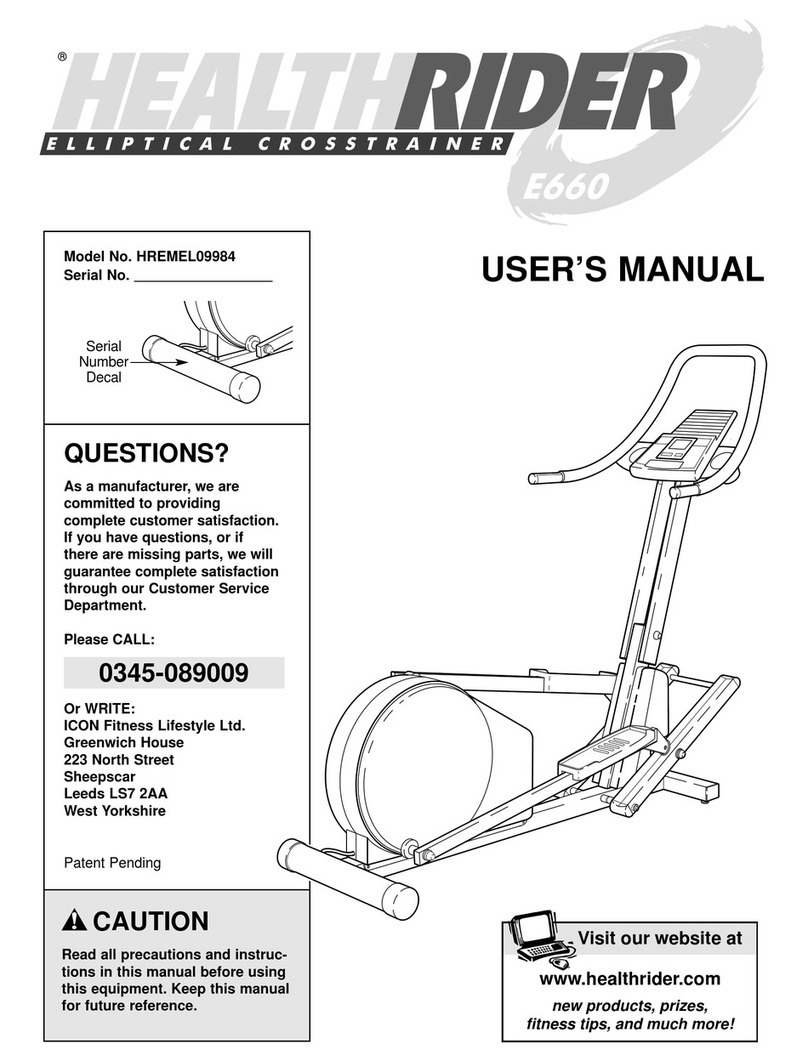
HEALTH RIDER
HEALTH RIDER E660 Elliptical manual
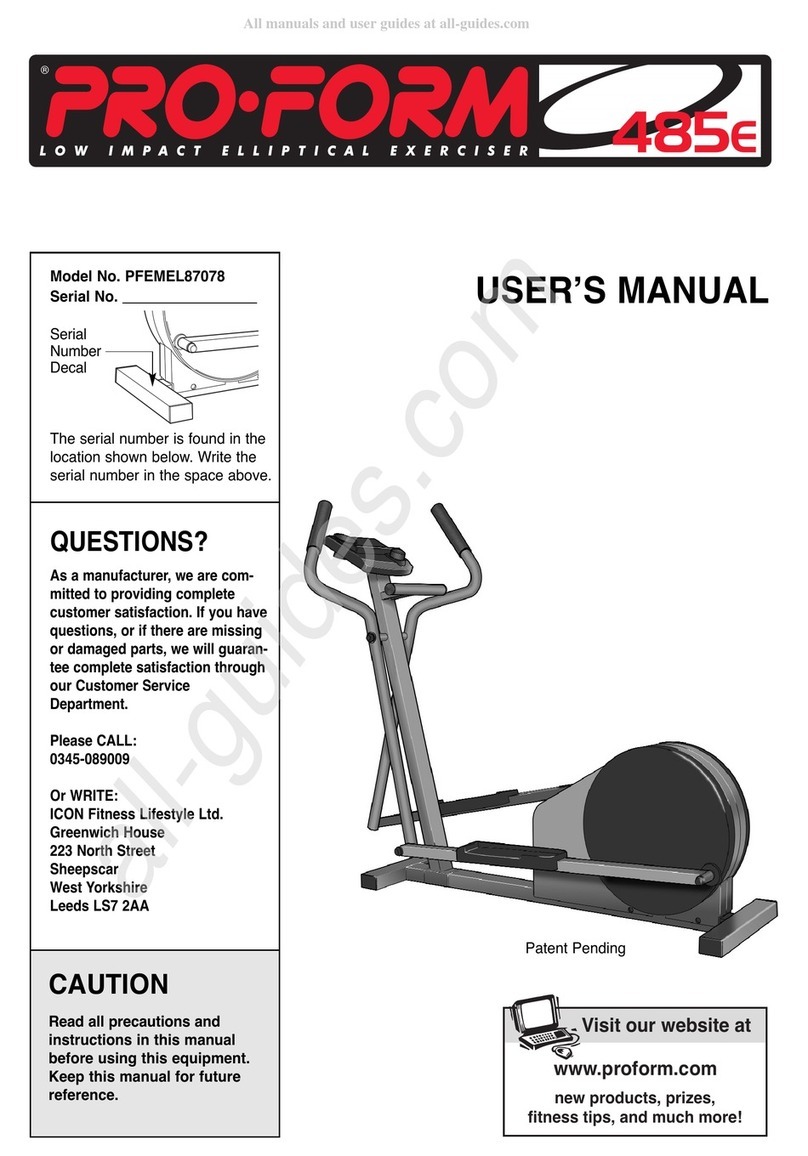
Pro-Form
Pro-Form PFEMEL87078 user manual

HEALTH RIDER
HEALTH RIDER Crosstrainer 950 S Elliptical Manuel de l'utilisateur
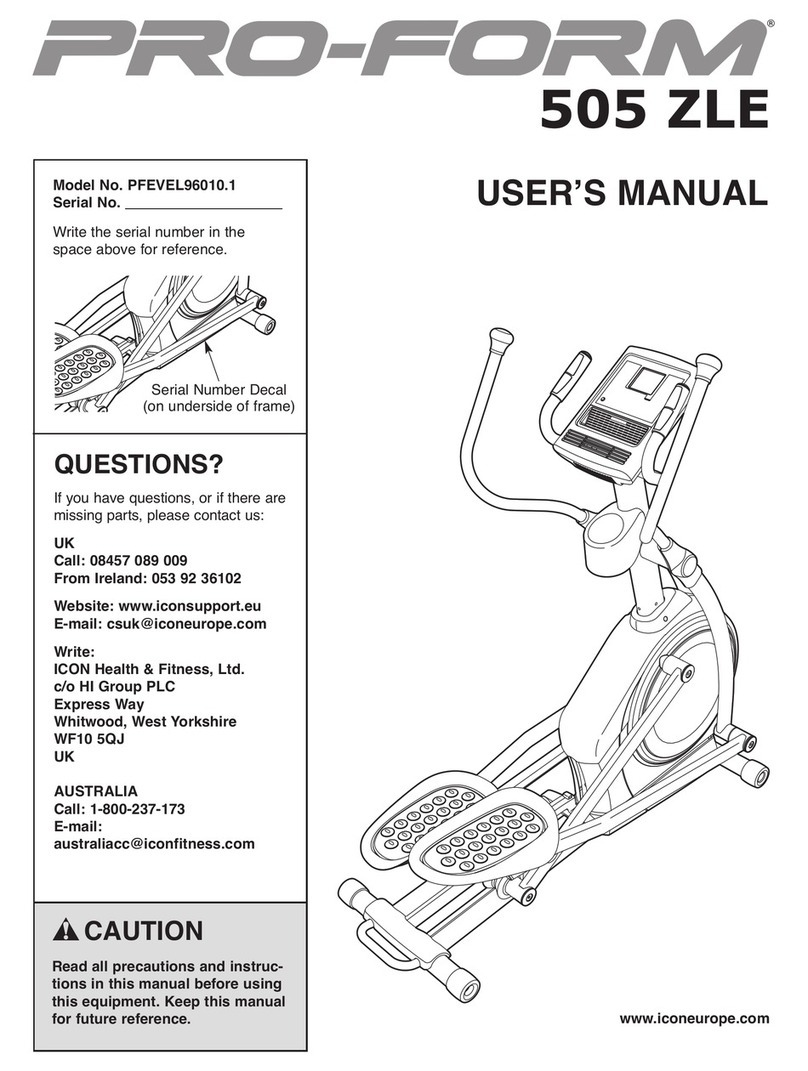
Pro-Form
Pro-Form 505 Zle Elliptical manual

Life Gear
Life Gear 93470 owner's manual

